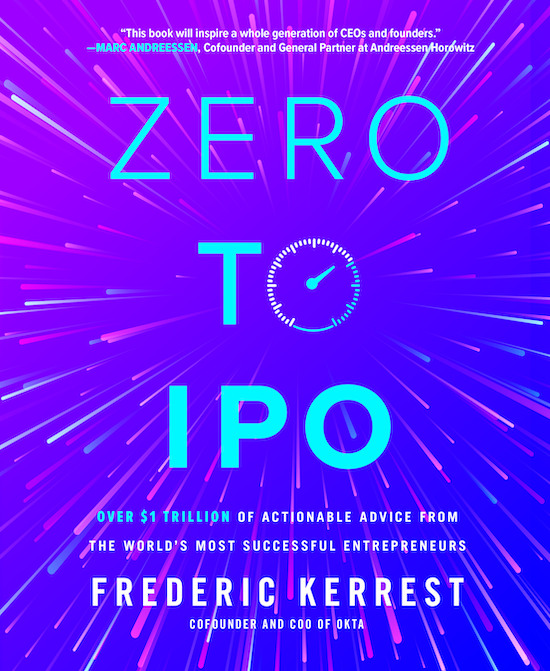It was July 2011 when I realized I had failed.
I was driving my ailing, seventeen-year-old Honda Accord down Harrison Street in San Francisco, and the heavy, gray blanket of summer fog seemed to press down on the city and on me particularly. I considered just driving back to my apartment and not showing up for the meeting. After all, what was there to say? Our business was doomed.
I started Okta with my friend Todd McKinnon in 2009. It was a pretty simple idea. We both believed business software was going to move online. The days of getting CD-ROM install discs would end soon. Eventually, somebody had to make sure that we could all sign in to software as it moved online. That had to be useful, right?
Todd and I walked into the small conference room at our cramped office where our board of directors was waiting. They had no idea that the news we were going to share would mean they were about to lose all the money they had bet on us. I tried to remember the moment, to lodge those smiles in my mind. Nobody was going to be smiling when we were done.
“Okay, well, I’ll dive into the quarterly report,” I said.
I had stayed up all night pointlessly adding slides to the presentation, hoping to soften up the directors with minutiae before coming to the bad news. As I clicked through the data, I could see their attention wandering. There was a slide about hiring. Another about client prospects. Finally, we got to the slide I’d been dreading: sales and revenue.
I was the president and COO. I’d spent two years pouring everything into this company. Now, I was sure it was worthless.
“Yeah, and so, next, I’m gonna highlight that we hit a speed bump with sales,” I said. “We missed our projections by 70 percent.”
Everybody looked up. That got their attention. They seemed to be wondering if they had misheard me. Perhaps I said 17 percent?
I clicked forward, and it was there for all to see. A 70 percent sales miss. Our revenues weren’t going up and to the right like all of our planned projections. It had flatlined like someone whose heart had stopped. Nobody was buying what we were selling.
“You show us a bunch of random shit before you show us this?” one board member asked, astounded.
“Let me tell you one thing,” another board member snapped. “This is the kind of presentation that should only be a single slide long.”
Then, they told me to get out of the room. They were going to talk to us individually so they could figure out what the hell was going on. Since Todd was the CEO, they’d speak to him first.
I stepped outside and looked around the office. I was the president and COO. I’d spent two years pouring everything into this company. Now, I was sure it was worthless. To make things worse, my wife had just finished her medical residency, and we’d taken on a bunch of debt. Stress levels were at an all-time high. I needed some air.
“You show us a bunch of random shit before you show us this?” one board member asked, astounded.
An hour later, as I was driving aimlessly around the city, I got a call from Ben Horowitz, one of our board members. Ben and his partner Marc Andreessen had given us half of the $1 million seed money we’d used to start the company. Less than 12 months later, they’d put in another $8.85 million.
“You know that forecasting doesn’t translate into sales, right?” he said.
I mumbled something lame, and he cut me off. I figured he was going to fire me and shut the company down.
Instead, he gave me two pieces of advice. He didn’t tell me to work harder, or berate me for being an idiot (though that’s what I felt like). He drew on his own experience as a founder who’d faced near-bankruptcy himself, and gave me specific, tactical suggestions for how we could pull ourselves out of our death spiral. It was wisdom he learned the hard way.
Ben Horowitz's Simple Advice for Startup Founders
- Hire experts, and fast.
- Hire people who can do what you can't.
Too often in business, this kind of knowledge is only shared among a select few. It’s the kind of thing that gets passed person-to-person. And yet, for a startup founder, it often makes the difference between success and failure. In my case, the advice turned everything around. We immediately implemented Ben’s ideas, and things started to look up. Sales increased, and the business began to grow rapidly. Six years after that fateful board meeting, Okta went public, and the company is, as of this publication, worth over $30 billion dollars.
If it weren’t for that advice, at that moment, I don’t think Okta would have survived. It changed the course of the company — and the course of my life.
1. Hire Experts — and Fast
When Ben called, I assumed he was going to fire me. After all, Todd and I had just told the board that we’d drastically missed our sales targets — and I was the person responsible for sales.
Instead of showing me the door, Ben asked me to describe my job. I explained what he already knew. I was the chief operating officer.
“What else are you doing?” he asked.
Our company was still pretty small. We only had about 30 employees. Todd and I ended up taking on a lot of extra roles. I headed up sales, and Todd was both the CEO and the head of engineering. We were effectively working two, maybe three jobs apiece.
“So here’s your problem,” Ben said. “You can’t do multiple key jobs at the same time and do them well. Very few people can. Which means that you have to hire experts — and fast.” He suggested that I shouldn’t be the head of sales, especially since I’d never run a sales organization. “That’s why your pipeline management, sales process and forecasting are terrible,” he said. Ben went on to say the same about Todd: He couldn’t be both the CEO and the head of engineering. “You guys need to build out your executive team,” he advised. “Otherwise, you’re toast.”
This is the power and importance of a startup’s board of directors. They should be able to see what you don’t.
Todd and I took the advice to heart. We immediately started a search for two new vice presidents. Within six months, we’d filled both positions. The impact was dramatic. In 2012, Okta’s sales started to pick up, and the product improved rapidly.

Many entrepreneurs try to do everything themselves for as long as possible. Partly out of necessity: You don’t have the money to hire people. But often, it’s because you think you can do it better than anyone else.
I’m telling you this from personal experience: You can’t.
Doing everything on your own doesn’t work. As you grow, you need to start assembling a team — people who are better at other pieces of the puzzle than you. This is one of the most profound lessons I’ve learned. A company isn’t about one person. It’s about assembling a team of highly talented people.
Who you hire matters a lot. Mature, established companies can afford to hire people who are merely “just fine.” You can’t. You’ve got too much to do in too short a time. The right people help you move fast. The wrong people — no matter how nice or talented they are — drag you down like a lead balloon. If you’ve never hired people before, it’s easy to make mistakes. Even if you have experience, it’s not always clear what to look for.
2. Hire People Who Can Do What You Can’t
In 2011, our sales were cratering. The small-and medium-sized businesses we were targeting didn’t need what we had built. We started with them because we thought we needed to build a healthy foundation with those customers before we could go after big, enterprise-scale companies, which were the ones we really had our eyes on. Ben told us that we were flat wrong.
“So here’s your problem,” Ben said. “You can’t do multiple key jobs at the same time and do them well. Very few people can.”
This is the power and importance of a startup’s board of directors. They should be able to see what you don’t.
The Okta platform does a lot of important things today, but when Todd and I started, we only had a couple products, one of which helped companies onboard and offboard employees. It’s a process that gets more complicated — and therefore more painful — the bigger a company gets and the more employees it has. Ben pointed out that smaller companies didn’t really feel the pain, and so they weren’t biting. The big companies, however, were the ones that had the problem, and they would leap at our solution — if we could figure out how to reach their decision makers.
Ben was right. But we didn’t have any experience pitching those big companies. With their thousands of employees, we weren’t sure how to identify which executives to target and how to approach them. That’s when he reminded me: You need to hire people who can do the things you can’t. So we quickly recruited a new sales team and shifted our attention to these larger companies. Within a few months, our sales ticked up, and within the year, we were seeing exponential sales growth.
We survived because of our board.
* * *
Excerpt from Zero to IPO: Over $1 Trillion of Actionable Advice from the World's Most Successful Entrepreneurs by Frederic Kerrest, pp. 4-5, 38-39, and 176 (McGraw Hill, April 2022).





